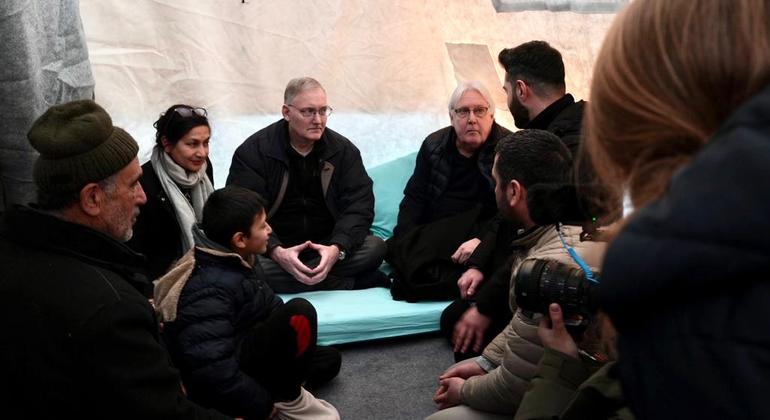
Mr. Griffiths was speaking in the Turkish city of Kahramanmaraş, where recovery efforts are ongoing in frigid temperatures.
He met with families left homeless by the disaster and listened to their stories of shock and devastation.
“I am here to make sure that these people also are not forgotten,” he said.
Hope for survivors
The UN relief chief also spoke with search and rescue teams as they carried out their operations in the devastated central parts of the city, amid collapsed buildings with excavation equipment digging through the debris.
UN teams are already on the ground, and more than 130 countries have dispatched responders, sniffer dogs, experts and other personnel.
“There has never been an international response, a Turkish response, to a natural disaster, as we see here in these terrible days,” said Mr. Griffiths.
He praised the courage of people, including parents, who are working round the clock in efforts to rescue their families and children from the rubble – “hoping for one more sound, for one more person to survive.”
Humanitarian support
It is estimated that more than 20,000 people have died in the double earthquake, which struck southeastern Türkiye and northern Syria early on Monday morning.
Millions more have been left homeless, including Syrians displaced by the 12-year war in their homeland and thousands of refugees who have fled across the border.
For Mr. Griffiths, the next phase will be to look after those affected by the tragedy.
“And I’ve met some of them already today,” he said, “people who’ve lost their homes, whose children don’t have schools to go to, who have no food, who have no money, who depend on the generosity of the Turkish people, the Turkish government and the international community.”
Mr. Griffiths is expected to visit the UN-authorised cross-border operation to Syria in the south of Türkiye on Sunday before travelling there.
The UN and partners will also launch appeals for the two countries.
In a video on his Twitter, Mr. Griffiths said “I hope what we will see is the same kind of generous, immediate and urgent international response to humanitarian needs that we have seen to those organizations helping the people of these cities to rescue the living from the dead.”
Heartbreaking conditions
Meanwhile, the head of the World Health Organization (WHO), Tedros Adhanom Ghebreyesus, arrived in Aleppo, Syria, on Saturday.
“I’m heartbroken to see the conditions survivors are facing – freezing weather and extremely limited access to shelter, food, water, heat and medical care,” he wrote in a post on his official Twitter account.
In a separate tweet, Tedros recounted how he met two babies, Nour and Omar, who lost their parents in the earthquake.
“There are no words to express the pain they are going through. Grateful to colleagues and partners who are providing them with needed care, comfort and love,” he wrote.



